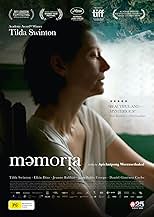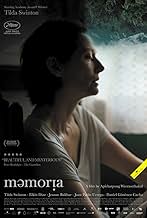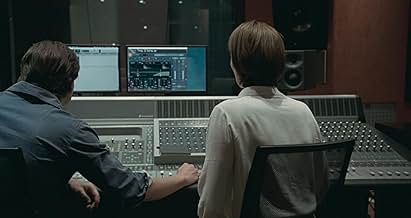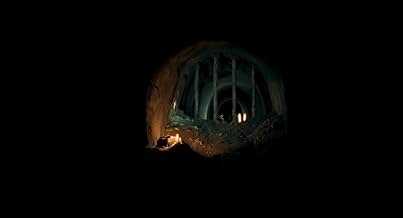AVALIAÇÃO DA IMDb
6,4/10
12 mil
SUA AVALIAÇÃO
Uma mulher da Escócia, enquanto viaja pela Colômbia, começa a notar sons estranhos. Logo ela começa a pensar em sua aparência.Uma mulher da Escócia, enquanto viaja pela Colômbia, começa a notar sons estranhos. Logo ela começa a pensar em sua aparência.Uma mulher da Escócia, enquanto viaja pela Colômbia, começa a notar sons estranhos. Logo ela começa a pensar em sua aparência.
- Direção
- Roteirista
- Artistas
- Prêmios
- 9 vitórias e 27 indicações no total
Daniel Toro
- Anthropologist Assistant
- (não creditado)
Avaliações em destaque
"Enjoy the silence" a title card states as Apichatpong Weerasethakul invites the viewer to experience MEMORIA; And, an experience it truly is as Weerasethakul's metaphysical film infuses the viewer with natural sights and sounds. That opening acts almost as an overture, as the Director's personal sketches are superimposed over still photographs from the production of the film - all 'scored' to absolute silence.
MEMORIA's protagonist is Jessica (Tilda Swinton) who awakes one morning to a mysterious sonic bang. Jessica is a botanist living in Columbia who is visiting her sister in Bogota. The bang continues to haunt Jessica as she goes about her daily life. Slowly, she feels that her mind is slipping - is she imaging the sounds? People she believes she has met don't seem to exist. On a drive back to her home in Medellin, she meets (or does she?) a man named Hernan (Elkin Diaz) and they spend a long afternoon together.
Weerasethakul's film doesn't have a formal plot. Swinton is so attuned to her filmmaker's methods that she inhabits rather than acts. The Director's method is to utilize only the most minimal of editing with extended takes. Cinematographer Sayombhu Mukdeeprom exquisitely captures the crucial mood and beauty of the natural world on 35mm film. The sonic bangs seem ever more loud because the sound design accentuates an organic soundscape; even the human voices are seemingly mixed below normal levels.
"Sometimes there's no escape except in dreams" reads another title card after the 'overture'. The classical definition of "Memoria" can be very loosely translated as "Memory", but its true meaning is much deeper. It describes a way in which the human mind stores and utilizes those thoughts and senses. The sonic bangs can be seen as a way of triggering Jessica's states of consciousness. Her own Memoria.
MEMORIA isn't a film for general audiences. Indeed, it's release is a never-ending world tour with the Producers claiming it shall never be sold for home viewing - streaming or physical media. It's very much a communal experience in a theater. The aural and visual tour de force to be savored not only by the individual -- but, by the audience in toto.
MEMORIA's protagonist is Jessica (Tilda Swinton) who awakes one morning to a mysterious sonic bang. Jessica is a botanist living in Columbia who is visiting her sister in Bogota. The bang continues to haunt Jessica as she goes about her daily life. Slowly, she feels that her mind is slipping - is she imaging the sounds? People she believes she has met don't seem to exist. On a drive back to her home in Medellin, she meets (or does she?) a man named Hernan (Elkin Diaz) and they spend a long afternoon together.
Weerasethakul's film doesn't have a formal plot. Swinton is so attuned to her filmmaker's methods that she inhabits rather than acts. The Director's method is to utilize only the most minimal of editing with extended takes. Cinematographer Sayombhu Mukdeeprom exquisitely captures the crucial mood and beauty of the natural world on 35mm film. The sonic bangs seem ever more loud because the sound design accentuates an organic soundscape; even the human voices are seemingly mixed below normal levels.
"Sometimes there's no escape except in dreams" reads another title card after the 'overture'. The classical definition of "Memoria" can be very loosely translated as "Memory", but its true meaning is much deeper. It describes a way in which the human mind stores and utilizes those thoughts and senses. The sonic bangs can be seen as a way of triggering Jessica's states of consciousness. Her own Memoria.
MEMORIA isn't a film for general audiences. Indeed, it's release is a never-ending world tour with the Producers claiming it shall never be sold for home viewing - streaming or physical media. It's very much a communal experience in a theater. The aural and visual tour de force to be savored not only by the individual -- but, by the audience in toto.
To me this is the main issue with Memoria. For example, the IMDB question about spoilers is not even needed, there can be basically no spoilers when reviewing this film, since the "narrative" (can't really call it that) is fragmented and merely the pretext for the reflections the movie undertakes on several clever memory-related topics (notably the reality of recollection), from the simple perspective of the experiences concerning a single human individual, to the collective thoughts of a society as a whole. In that vein the characters and some movie conventions (the classical journey of the main character, although we are never sure what it exactly is) are used as a sort of vessels.
As long as that is accepted I found that most of my criticism (which would put me firmly on the side of "bad" reviewers) fell off the wayside, and I enjoyed this beautifully shot contemplative piece for what it was.
But why didn't I rate it higher? Frankly because I was underwhelmed with the meditation itself or the tropes enveloping it (as I saw them), finding some of them trite and even ridiculous. Meditation around different issues comes also from some sort of familiarity, and I was not convinced that the filmmaker was not merely a tourist in this universe, rather than someone with a particularly deep insight.
This sort of approach is, of course, totally acceptable, just not something I could relate to here, as I could in other films he has done. And thus issues such the length of the film (as well as some of the sequences) became a problem, which would not have been the case had I felt fully in sync with the piece.
As long as that is accepted I found that most of my criticism (which would put me firmly on the side of "bad" reviewers) fell off the wayside, and I enjoyed this beautifully shot contemplative piece for what it was.
But why didn't I rate it higher? Frankly because I was underwhelmed with the meditation itself or the tropes enveloping it (as I saw them), finding some of them trite and even ridiculous. Meditation around different issues comes also from some sort of familiarity, and I was not convinced that the filmmaker was not merely a tourist in this universe, rather than someone with a particularly deep insight.
This sort of approach is, of course, totally acceptable, just not something I could relate to here, as I could in other films he has done. And thus issues such the length of the film (as well as some of the sequences) became a problem, which would not have been the case had I felt fully in sync with the piece.
I like slow-burning films; the idea of being given enough time to really live in the movie you are watching really appeals to me, often more so than faster-paced, spectacular projects. I also like arthouse films; the atmosphere and characters can often be just as engaging, if not more, than a traditionally linear storyline. Thing is, you need to have at least the semblance of a storyline in a film, otherwise, it's like buying a loaf of bread and finding no bread in it!
Memoria is deliberately pitched at a snail's pace. There isn't a storyline as such, but rather a series of events, some of which we return to. Clearly, Apichatpong Weerasethakul, who writes and directs, has a vision for this - together, one would presume, with his cast and crew. For the most part, it leaves me cold, and I find myself trying to imagine how Weerasethakul initially tried to communicate what he is trying to achieve here to his actors. I actually felt the makers were taking the mickey, daring me to stick with this when they have no intention of providing much reason to, or indeed any kind of pay-off.
Some will undoubtedly tell me I don't 'get' it, and that's almost certainly true, but I can't honestly see that there is anything *to* get, because with the suspension of disbelief fully installed, all I see here is a group of blandly inoffensive people doing very little except having whispered conversations and being desperately polite to each other in front of an unmoving camera. There were times when I had to wait for someone to blink to convince myself the BluRay hadn't frozen. This left me cold, I'm afraid. My score is 3 out of 10 for some nicely filmed locations.
Memoria is deliberately pitched at a snail's pace. There isn't a storyline as such, but rather a series of events, some of which we return to. Clearly, Apichatpong Weerasethakul, who writes and directs, has a vision for this - together, one would presume, with his cast and crew. For the most part, it leaves me cold, and I find myself trying to imagine how Weerasethakul initially tried to communicate what he is trying to achieve here to his actors. I actually felt the makers were taking the mickey, daring me to stick with this when they have no intention of providing much reason to, or indeed any kind of pay-off.
Some will undoubtedly tell me I don't 'get' it, and that's almost certainly true, but I can't honestly see that there is anything *to* get, because with the suspension of disbelief fully installed, all I see here is a group of blandly inoffensive people doing very little except having whispered conversations and being desperately polite to each other in front of an unmoving camera. There were times when I had to wait for someone to blink to convince myself the BluRay hadn't frozen. This left me cold, I'm afraid. My score is 3 out of 10 for some nicely filmed locations.
This movie is very hard to watch and requires much patience. If you can connect with the movie, it will make it easier to watch. There are very long and still sequences. From the beginning to the end of the film, confusion prevails. We cant really understand what is happening. Nothing is clear. And the movie does not give us many answers. This is a "feel" movie. If you cant connect with the characters or the storyline it will be a disappointing experience for you.
In "Memoria" Tilda Swinton plays Jessica Holland, an expat woman from Scotland who lives in Medellín and is in the market-gardening business. One night, Jessica is awoken from a sleep by a strange bang, like a sonic boom. This is the long version of the movie. The short version is "what did I just watch?" If they had made a short movie (35 minutes), you would still ask the same question. This is by far the slowest movie I have ever seen and then having to admit I still did not understand the plot? Or was there no plot? Was there even a movie? So many questions that might never be answered. This movie left me behind feeling very frustrated. It might have been a masterpiece or just the opposite. But if I have to stare at trees, roads, the sky etc for at least 75% of the movie, I fall asleep. There is one thing that is very good about this movie, and that is the always wonderful acting Tilda. Without her, this movie would not even exist. This is the trick, use Tilda and some people might actually come and see the movie of my twisted "Memoria". And the only good scene was when Jessica was visiting the doctor. She was trying to ask Xanax but had to struggle to get a prescription because Xanax is addictive! And this is happening in Medellin, once the cocaine capital of the world...
Você sabia?
- CuriosidadesIn an unconventional move, art-house film distributor Neon is releasing Memoria in the USA "from city to city, theater to theater, week by week, playing in front of only one solitary audience at any given time." And furthermore, according to IndieWire (10/5/21) the film will only play in theaters and it will not become available on DVD, on demand, or on streaming platforms. They later abandoned this release strategy though after touring through only New York and Chicago and the film was eventually released in many cities simultaneously across North America in April, 2022.
- Citações
Older Hernán Bedoya: I remember everything, so I limit what I see.
- ConexõesReferenced in Radio Dolin: Stream with Anton Dolin (2021)
- Trilhas sonorasMemoria
Written by César López
Piano performed by César López
Cello performed by Sandra Parra
Recorded by Julio Monroy
Recorded in Bogotá, Columbia by Burning
(C) 2020 Burning
Principais escolhas
Faça login para avaliar e ver a lista de recomendações personalizadas
- How long is Memoria?Fornecido pela Alexa
Detalhes
Bilheteria
- Faturamento bruto nos EUA e Canadá
- US$ 52.656
- Fim de semana de estreia nos EUA e Canadá
- US$ 6.797
- 26 de dez. de 2021
- Faturamento bruto mundial
- US$ 588.713
- Tempo de duração2 horas 16 minutos
- Cor
- Mixagem de som
- Proporção
- 1.85 : 1
Contribua para esta página
Sugerir uma alteração ou adicionar conteúdo ausente


























